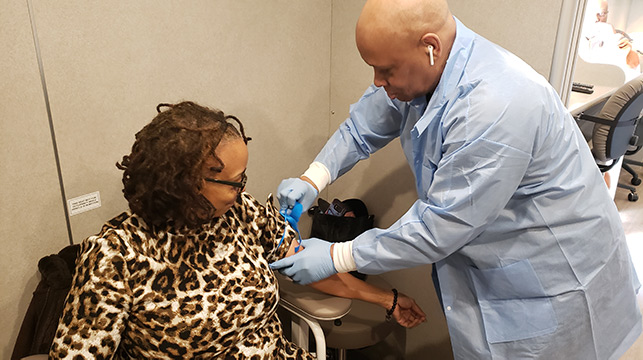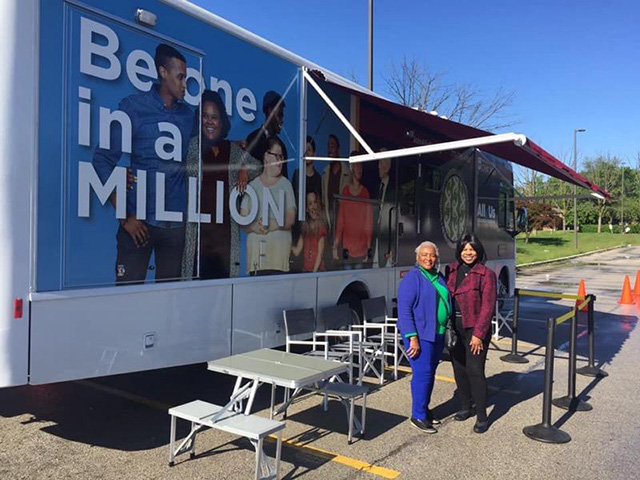Mobile units expand reach and accessibility for South Side communities to participate in research

You may have seen them rolling through your neighborhood: large, colorful vehicles resembling RVs boldly proclaiming “The Future of Health Begins with You” or “Precision Health for All.” Inside, the vehicles look remarkably similar to a doctor’s office, with a waiting area, exam rooms, and a small lab for processing samples.
These are two mobile research units operated by the Institute for Population and Precision Health (IPPH) at the University of Chicago. They are used to enroll community participants in a national precision health program sponsored by the National Institutes of Health called All of Us and a local precision health program called COMPASS, or the Chicago Multiethnic Prevention And Surveillance Study, run by researchers at the University of Chicago Medicine Comprehensive Cancer Center.
The goal of All of Us is to build a cohort of one million people who are willing to share information about their health, lifestyle and genetics to drive future medical breakthroughs. COMPASS is a long-term research program that looks at the impact of factors such as lifestyle, healthcare access, the environment and genetics on the health and health disparities of Chicagoans.
Over time, the data generated by participants of both studies will allow researchers to gain insights into how diseases develop and what can be done to prevent them.

UChicago Medicine is taking a unique approach to engaging participants in research. Instead of recruiting solely from the hospital campus in Hyde Park, the IPPH is bringing precision health programs directly to Chicago residents and UChicago patients in the neighborhoods where they live.
The IPPH team worked to ensure that the mobile units are fully equipped for enrollment and data collection to meet the research needs in the field. Each unit has an accompanying van to transport personnel and additional supplies. In November 2019, the fleet of vehicles launched with an official ribbon-cutting ceremony at UChicago Medicine.
In preparation for the deployment of the mobile units, the IPPH spent a year developing relationships with community-based partners and ambassadors. These community ambassadors helped recruit participants to the study and bridge the digital divide for older residents who were less familiar with the iPad technology used in the All of Us consent and enrollment process. Brisa Aschebrook-Kilfoy, PhD, a research associate professor in the Department of Public Health Sciences and co-investigator at IPPH, says that these community partners were crucial in helping the IPPH open a dialogue about population and precision health with the diverse neighborhoods in the area it serves.
“Our hope is that together we can lay the groundwork for a new community-based research model that helps retain participants and ensures that communities historically underrepresented in biomedical research are represented in these newer programs,” she says. “We want what we learn, in everything from general health to cancer and cancer disparities, to be relevant to the population we serve.”

Eligible city residents are welcome to enroll in both All of Us and COMPASS studies simultaneously. Residents who sign up for either or both programs through the mobile units can expect their experience to be similar to a doctor’s visit. The vehicles are equipped with stations where participants use an iPad to complete surveys on their health history, plus two exam rooms where phlebotomists can draw blood and record participants’ height, weight, and blood pressure. Blood and urine samples are processed on the spot by research professionals in the onboard lab space.
The All of Us consent process and health surveys typically take about an hour to complete but can be finished ahead of time before coming to the mobile unit. The collection of biospecimens and biometric data onsite takes about 30 minutes, and participants are compensated for their time with $25-75, depending on whether they enroll in one or both of the research programs. Anyone 18 or older can join All of Us, while COMPASS is recruiting participants over 35 years.
Although neither study provides medical treatment, participants will have access to some information about their health generated in the course of these research programs. However,
